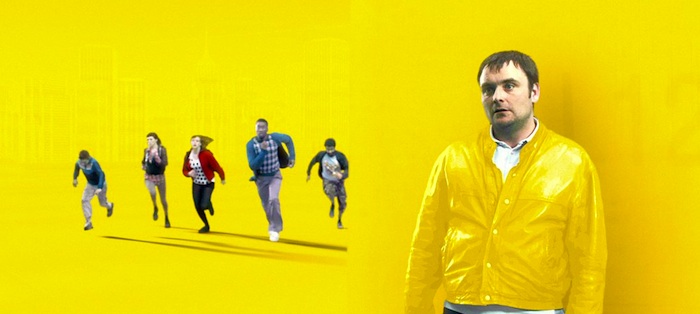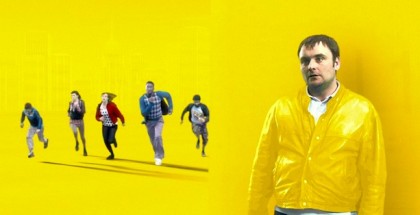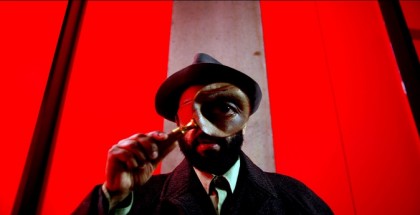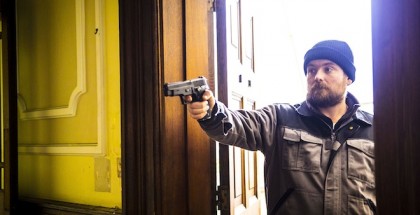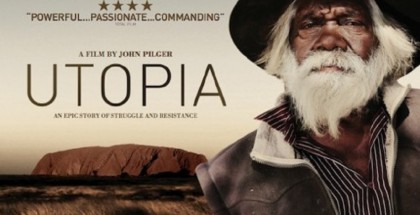Utopia Season 1: Shockingly original TV
David Farnor | On 13, Jul 2014
This is a spoiler-free review of Utopia Season 1. Already seen it? Read on at the bottom for additional spoilery notes – or read our review of Season 2 here.
“It’s a graphic novel. It’s about a scientist who makes a deal with the devil.”
Mankind is screwed. That’s what we soon gather from Utopia, Channel 4’s TV series which shocked viewers when it premiered in January 2013.
Written by Dennis Kelly, it follows a group of people who have come into possession of the unpublished manuscript of Utopia, a graphic novel which legend has it holds the secret meaning to all the disasters of the 21st Century. It’s written by a scientist who supposedly went mad, but if that’s true, why are curious do-gooder Ian (Nathan Stewart-Jarrett), nerdily-obsessed Becky (Alexandra Roach) and underground hacker Wilson (Adeel Akhtar) suddenly pursued by a sinister organisation known as “The Network”? And why has his daughter, Jessica Hyde, turned up on their doorstep?
Through the cartoonish frames step our team, which expands to include schoolboy Grant (an impressively resilient Oliver Woollford) and, of course, Jessica herself (an eerily ruthless Fiona O’Shaughnessy). But we get a good glimpse of the bad guys too, whose influence appears to infiltrate all levels of society – even the government, where exasperated civil servant Michael Dugdale (Paul Higgins) finds himself blackmailed over an affair.
“Where is Jessica Hyde?” snivels unsettling henchman Ardy, played by Neil Maskell. The actor made his name in Ben Wheatley’s Kill List and his trademark blend of intimidation and awkwardness is equally potent here. He steals the show with barely a word, shuffling strangely around and doing anything to get the manuscript, from removing someone’s eyeball with a spoon to – in the show’s most upsetting bout of violence – shooting young children. Yes, things get nasty in Utopia. And they get nasty quickly.
Despite the darkness, though, the show’s overwhelming impression is vivid and bright: Ole Bratt Birkeland’s almost garish cinematography paints the modern world with sickly yellow fields, neon green trees and violently claret blood. It’s a comic book of reality, Britain through an Instagram filter turned to 11. Combined with the experimental score by Cristobal Tapia de Veer, the effect carries the astonishment of the new – and the disquiet of the familiar.
That contrast repeatedly stuns, but the series’ sucker punch comes from its logic. Every action by a character makes sense – or, at least, after experiencing the warped visuals and strange story twists, it feels like they do. In fact, their overarching plan is repeatedly presented as common sense, a clinical solution for a problem far bigger than the population dares to think.
Adeel Akhtar, so good in Four Lions, embodies that shifting sense of right and wrong, his tortured face unsure whether to turn a blind eye, even when confronted by Becky’s outraged conviction. Utopia is an almost defeatist piece of science fiction; a dystopia that isn’t, because it’s a real place rather than imaginary. Things aren’t set in the future but depressingly anchored to where we are now: a technological society; a corrupt nation; a race that has exhausted its natural resources and is running out of room to stay alive.
Narrative turns unfold in a typical conspiracy theory manner, but where some US TV programmes would stretch out this mystery indefinitely, Dennis Kelly packs everything into just six grisly episodes.
The ending is where most high-concept series would fall over, but even this satisfies in a characteristically bleak way. The answer to the show’s questions is one that renders almost everything that has gone before futile, yet asks a heap of new questions. That concise storytelling, combined with the grim tone and original plot (this is not a remake or adaptation of anything), marks Utopia out as an original, uniquely British production – and one of the best UK TV series of recent years.
The prospect of another six episodes is thrilling – and guaranteed to be shocking.
Utopia is available on BritBox, as part of a £5.99 monthly subscription.
Where can I buy or rent Utopia online in the UK?
Utopia Season 1 recap (spoilers)
Need a quick reminder of what happened in Season 1 of Utopia? Here’s a brief recap.
Ian, Becky and Wilson meet in an online forum after one of them acquires the manuscript for an unpublished sequel to graphic novel Utopia. Rumoured to be written by a mad scientist, it predicts disasters throughout the 21st Century – and a secret message. 11-year-old Grant joins them and soon finds that he’s the one left holding the drawings, while sinister henchmen murder those around him.
Enter Neil Maskell’s Arby, who snivels and shuffles after the whole group in search of Jessica Hyde. When they won’t tell him, he tortures Wilson, threatening his dad before rubbing sand in his eye and removing it with a spoon.
Out of the blue, Jessica turns up, taking the whole group on the run. She is the scientist’s daughter, it turns out, and does not hesitate to shoot, detonate or kill if it keeps her alive. Ian and Becky aren’t sure about her, but find themselves equally sure of each other. While their relationship blossoms, Grant makes friends with a young schoolgirl Alice, who lets him hide in their house – he gives he the manuscript for safety, a move that can only end well.
Arby massacres a school – a horrific way to start Episode 3 – and frames Grant for it. The police begin to hunt for him, while civil servant Michael Dugdale is blackmailed over an affair with a prostitute, whom he has impregnated. His instructions? Approve a new antidote to Russia flu and save his marriage.
Arby tracks down Grant at Alice’s and comes face to face with Jessica for the first time. A showdown sees them escape – but Alice’s mother shot dead. She joins the group, who flee to a manor house in the country, and struggles to get over her mum’s death.
Just as we think we know who to trust, it turns out Becky has a secret illness (Deals Syndrome), which she needs medication for – serviced by dodgy pharmaceutical guy Simon McBurney. He wants his hands on the comic book too. But Dugdale has also made contact with McBurney, as the good guys work out what Utopia is all about. They learn they must find “Mr. Rabbit”, who is the head of The Network. Kidnapping a civil servant whom they suspect to be the leader, they interrogate him. He tells them the truth: that the Russian flu is fake, an excuse to give the population the fake antidote, which will actually sterilise 90 per cent of the human race. This “Janus virus” will make it possible for the population to die off without bombs or war, ending the current strain on natural resources – a calculated chemical wiping out of the species.
“What are you going to do, use energy saving lightbulbs?” sneers their prisoner, convincing Wilson that it is the logical thing to do to save the human race. The conflicted Wilson, fearing for his father’s life, agrees to help The Network. The real shock of the episode, though, comes from somewhere else: Alice, who, thinking that their prisoner is responsible for her mum’s death, shoots him dead. The futility of her transgression is as bleak as anything on screen.
After managing to get hold of the antidote, the group make contact with an MI5 agent named Milner, the only one they can trust. She says Hyde’s father’s work is vital: the Janus virus, that he hid the most important part of the puzzle in his most prized creation.
The group then talk to Dugdale and try to get him to stand up against The Network. They ruin his marriage, while Dugdale calls the police, who arrest Grant and force him to surrender the manuscript.
While this happens, Jessica goes off with Arby to discover more about her father. It turns out he is her brother – they were both experimented upon by their dad, but Arby’s disturbing upbringing away from her led him to become the sociopath he is. Upset, she leaves him sitting in his old bedroom and goes back to the rest of the group.
Dugdale discovers the prostitute carrying his baby is an actress hired by The Network and helps Ian, Becky, Jessica and Wilson to blow up a warehouse containing the antidote. Wilson tries to stop them so Jessica stabs him and rescues Grant. Alice is adopted by Dugdale. Ian and Becky head to Scotland to lay low. The day, it seems, is saved. Becky, though, has a fit due to her lack of medication – McBurney has long thrown away the last of it – and disappears, leaving Ian and Grant to board the train without her.
Jessica, meanwhile, goes to hand Utopia to Milner – only to discover that she is actually Mr. Rabbit. Hyde runs to the roof of the London building and burns the manuscript once and for all. Milner laughs and reveals that the manuscript is pointless. Jessica is her father’s most prized creation: Hyde’s blood contains the Janus virus. Milner shoots Jessica in the leg. The Network have won.


